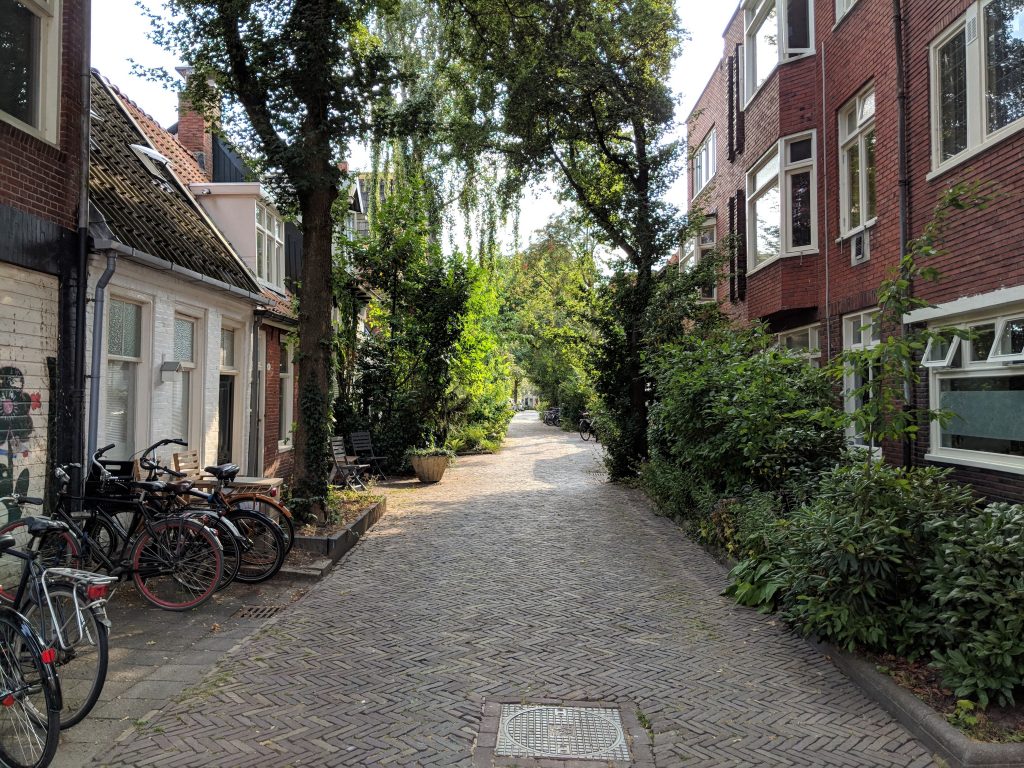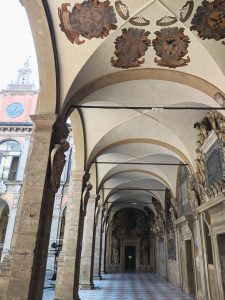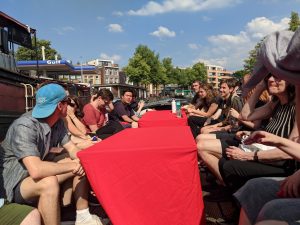
Parker Evans graduated from REL with a BA, in the Spring of 2018, and is currently working on his MA in Gender and Race Studies, here at UA
Coming up on a year ago, shortly after the Department’s Honors Research Symposium, I applied for a couple of summer programs in Europe at the suggestion of Dr. Loewen. He and I had a short conversation in which I told him I was planning on taking a tour of Europe following my graduation. He told me about his experience at UCSIA to let me in on a secret: programs called “summer school” take place all around the world for a concentrated study of specific topics. Several take place in Europe (Hint: in New Zealand and Australia, they are called winter school; e.g. the Center for Humanities Research).
 I quickly did some research and found a few that piqued my interest. I used terms such as philosophy, theory, religion, and political science to find programs of interest to me. I even found a site that did some of the searching for me. I ended up applying to two: the Summer School in Global Studies and Critical Theory in Bologna, Italy; the other was hosted by the University of Gronigen in the Netherlands. I was rejected from the former and accepted to the latter, but I decided to have my cake and eat a little piece of it too.
I quickly did some research and found a few that piqued my interest. I used terms such as philosophy, theory, religion, and political science to find programs of interest to me. I even found a site that did some of the searching for me. I ended up applying to two: the Summer School in Global Studies and Critical Theory in Bologna, Italy; the other was hosted by the University of Gronigen in the Netherlands. I was rejected from the former and accepted to the latter, but I decided to have my cake and eat a little piece of it too.
I couldn’t attend the classes in the Bologna summer school, whose topic last summer was the question of humanism, but I could still attend the public lectures. So I started my travels off in Bologna in order to catch the lecture of Amitav Ghosh, a prominent Indian author of fiction. He was among an exciting roster of other outstanding thinkers and writers at the program last summer, among them Achille Mbembe and Paul Gilroy, as well as Judith Butler in the 2017 program.
The point here is not that I missed the opportunity to be in a classroom with these thinkers but that the opportunity is there, hidden away.
And while my professors in the Groningen program did not have the same “star power” as those in Bologna, our class was perhaps all the more productive for it. My experience of the program in Groningen, which was a survey of the Frankfurt School of Critical Theory, was a very intimate one.
While the prospect of going back to school during the summer, for no official university credit, may seem like academic masochism, it was a deeply rewarding experience. For the cost of about $350 dollars, we were put up in dorms and fed lunch each day. Considering the weekly cost of regular travel, that’s not a bad deal at all. The program lasted for five days (plus dinner and a city tour the preceding weekend), which turned out to be plenty of time to form sincere friendships with my classmates. The makeup of the program was relaxed enough that it comfortably included students from the undergraduate level to doctoral candidates. Most of them were from European countries, although China, Australia, and the United States (not including myself) were also represented.
 After graduating from UA, going straight into summer school made academia exciting in a way I had not experienced before. I had discussions in groups of people who spoke at least five different first languages, who had various nationalities and who articulated a variety of academic interests and applications. To facilitate dialogue across these differences, the classes were conducted in English (Two of the German students even spoke to each other in English so as not to alienate others). Most of the students stayed in the dorms provided by the University of Groningen (a welcome respite from the hostels I was used to). The common living space was especially nice because it gave us the time to discuss the authors we were reading outside of the more structured setting of the classroom. It would not be a stretch for me to suggest that these informal conversations were the most valuable part of the program. Not only were our particular conversations profound, but those conversations cemented the connections among us.
After graduating from UA, going straight into summer school made academia exciting in a way I had not experienced before. I had discussions in groups of people who spoke at least five different first languages, who had various nationalities and who articulated a variety of academic interests and applications. To facilitate dialogue across these differences, the classes were conducted in English (Two of the German students even spoke to each other in English so as not to alienate others). Most of the students stayed in the dorms provided by the University of Groningen (a welcome respite from the hostels I was used to). The common living space was especially nice because it gave us the time to discuss the authors we were reading outside of the more structured setting of the classroom. It would not be a stretch for me to suggest that these informal conversations were the most valuable part of the program. Not only were our particular conversations profound, but those conversations cemented the connections among us.
The secret within the secret of the summer schools is that, while the classes themselves are enjoyable, the programs themselves are wonderful points of communication and networking. This is not “networking” in the dry, business sense of knowing who to call for favors.
Rather, I have realized how I am being able to place myself as a scholar within a larger, international community of thought.
Almost all of my former classmates and I are friends on social media, and we get to peek into each other’s lives and academic developments. Being able to see myself within that community has been invaluable. If they are able, I would suggest that anyone heading into an academic career seek out their own respective communities through summer schools.